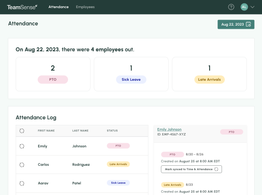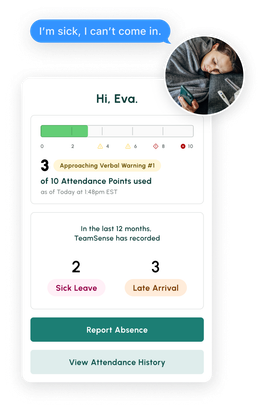Fix the root cause of No-Call No-Show with help from TeamSense
Usually, when an hourly employee calls in sick, you tell them to feel better or ask when they plan on coming back to work. If you have benefits or a more strict absence policy, then sometimes you need more information than just the notice of the absence.
Are you allowed to ask your employees why they are calling in sick? Is it legal? Can you ask for a doctor’s note? What about ADA-related illnesses? Do different states have different laws?
How can you respond to a sick employee to ensure that you collect accurate information in the same unbiased way that you collect it from everyone else?
What can you ask when an employee calls in sick?
Different companies have different policies when it comes to sick leave. Employers must follow their internal policies and procedures consistently, not favoring any one employee over another.
We serve Human Resources teams at large manufacturing and logistics companies, and we have daily conversations about what information they can gather when an employee calls off for illness. Here are some of the top questions we hear.
Can employers ask employees for a doctor’s note?
An employer may ask an employee to produce a doctor’s note, explaining the absence. However, an employer may not ask for specifics on a diagnosis or medicines prescribed.

Save Hundreds of Hours A Year With TeamSense
See how TeamSense saved HelloFresh 3-4 hours per day managing attendance through text. Read the case study and book your demo today!
Can employers ask employees any questions regarding ADA-related illnesses?
An employer is prohibited from asking any specific questions about an Americans with Disabilities Act (ADA) protected illness.
What about in a union shop? Can employers ask unionized employees why they are calling in sick?
If your hourly employees are unionized, you should review, understand, and follow the collective bargaining agreement (CBA), which should address sick days and the rights of the employees. Like any internal policies and procedures, this agreement should be followed to a T. If you have a question about the CBA or an employee’s actions or inactions, you should contact the union representative.
What about California? Can employers in California ask why employees are sick?
Different states have different laws when it comes to sick leave, but California is particularly stringent.
In California, a law passed in 2016 specifically states that California employees can use paid sick days beginning their 90th day of employment with their employer. The law also covers all employees—including part-time and temporary—if the employees worked for at least 30 days for the same employer within a calendar year.
Although this law does not specify what an employer can or cannot ask an employee about sick leave, the California Department of Industrial Relations interprets the state law as prohibiting an employer from denying sick leave to an employee who fails to present a doctor’s note.
How to respond to employees who text or call out sick
Make the call-off process easier by automating answer collection:
Collect structured data with a standard form so you can reduce the chance of error (or misinterpretation) of the employee’s response, the company’s policies and procedures, or the law.
By formally and adequately documenting the conversation with the employee, you have created a written record of the discussion in the event of possible dispute resolution.
Keep responses simple by asking standardized questions:
To reduce legal risk, human resources professionals should create standardized questions when asking an employee about sick time. This reduces the chance of a manager or other supervisor asking an illegal question by mistake.
By controlling the narrative, even if your company policy or applicable law changes, you don’t have to worry about managers adapting to comply. They should work from the script provided by HR, keeping them and your company legally on track.
Ensure you have detailed records of responses to and from the employee:
Mitigate your legal risk by retaining employee details and attendance history for any potential dispute or audit resolution while keeping your collected data all in the same place.

About the Author

Sheila Stafford, CEO | Leader in Applied AI for Frontline Productivity
As CEO of TeamSense, Sheila Stafford is at the forefront of increasing productivity for frontline teams through AI-driven solutions. Her visionary approach combines cutting-edge technology with a thoughtful focus on enhancing human connection; Sheila strategically implements AI where it adds the most value while recognizing the critical role of personal interaction and ensuring that human engagement remains central when it matters most. Under her leadership, TeamSense is redefining how companies support and engage their frontline teams for a more connected, efficient workplace.





